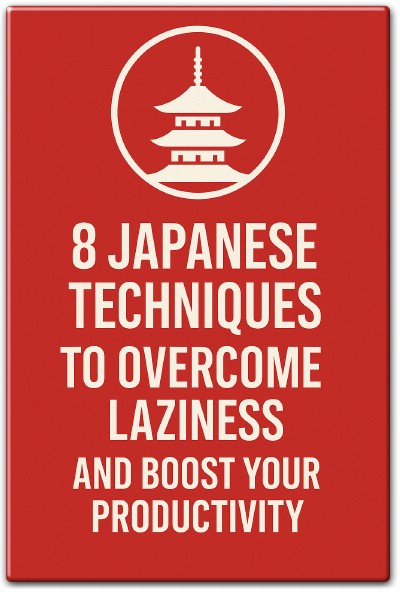Book Summary Contents
- 1 8 Japanese Techniques to Overcome Laziness and Boost Your Productivity
- 1.1 1. Ikigai: Find Your Purpose
- 1.2 2. Kaizen: Small, Consistent Improvements
- 1.3 3. Shoshin: Adopt a Beginner’s Mindset
- 1.4 4. Hara Hachi Bu: Know When to Stop
- 1.5 5. Shinrin-yoku: Forest Bathing for Mental Clarity
- 1.6 6. Wabi-sabi: Find Beauty in Imperfection
- 1.7 7. Ganbaru: Persevere with Effort
- 1.8 8. Gaman: Endure with Patience
- 1.9 How to Incorporate These Techniques into Your Life
- 1.10 Share:
8 Japanese Techniques to Overcome Laziness and Boost Your Productivity
Japan is renowned for its rich cultural philosophies that encourage discipline, mindfulness, and perseverance. These ancient teachings are not only about finding peace but also about achieving personal growth and overcoming common obstacles like laziness. If you struggle with procrastination or find it difficult to stay motivated, these eight Japanese techniques might be exactly what you need to overcome laziness and enhance your productivity. Let’s dive into each of them and explore how they can transform your life.
1. Ikigai: Find Your Purpose
One of the core principles of Japanese culture is Ikigai, which means “a reason for being.” It’s the idea that your life should have a meaningful purpose or goal. When you discover your Ikigai, you feel motivated and driven by passion, making it much easier to stay productive and avoid laziness. Find something that excites you, whether it’s a career, a personal project, or a hobby. With a clear purpose, getting out of bed and taking action becomes much simpler.
2. Kaizen: Small, Consistent Improvements
The philosophy of Kaizen is built around continuous, incremental improvements. The idea is simple: strive to get just 1% better every day. You don’t need massive changes or overnight transformations. Small steps, consistently taken, lead to huge improvements over time. Whether it’s improving your work habits, fitness, or learning a new skill, this approach keeps you moving forward without overwhelming you, helping you defeat laziness one small step at a time.
3. Shoshin: Adopt a Beginner’s Mindset
Shoshin, or the “beginner’s mindset,” encourages you to approach tasks with openness and eagerness to learn. When you approach challenges as a beginner, free from preconceptions or self-imposed limitations, you open yourself up to new possibilities and ideas. This mindset can help you break the cycle of laziness by igniting curiosity and enthusiasm, turning mundane tasks into opportunities for growth.
4. Hara Hachi Bu: Know When to Stop
Hara Hachi Bu is an old Japanese saying that means, “Eat until you are 80% full.” While it’s often associated with healthy eating, this principle can be applied to various aspects of life. By learning when to stop—whether it’s working, eating, or even exercising—you avoid burnout and stay energized. This prevents sluggishness and procrastination that often arises from overworking or overstretching yourself.
5. Shinrin-yoku: Forest Bathing for Mental Clarity
Shinrin-yoku, or “forest bathing,” is the Japanese practice of immersing yourself in nature to reduce stress and refresh the mind. Research shows that spending time outdoors, especially in forests, can lower stress levels, increase creativity, and boost your energy. When you feel mentally sluggish or uninspired, taking a walk in nature can give you the boost you need to overcome laziness and return to your tasks with renewed focus.
6. Wabi-sabi: Find Beauty in Imperfection
Wabi-sabi is the art of appreciating imperfection. This philosophy teaches you to find beauty in the unfinished and the flawed. By embracing imperfection, you let go of the pressure to be perfect, which can often lead to procrastination. Instead of waiting for the “perfect moment” or the “perfect conditions,” take action now. Remember, progress is more important than perfection.
7. Ganbaru: Persevere with Effort
Ganbaru means to persevere, to give your best effort no matter the challenges. In Japan, it’s a concept that emphasizes determination and resilience. This is crucial when facing moments of laziness. Instead of giving in to distractions or procrastination, remind yourself to ganbaru—push through, give it your all, and finish what you start. Perseverance breeds progress and helps you overcome any obstacle that stands in your way.
8. Gaman: Endure with Patience
The concept of Gaman encourages patience and endurance, especially in difficult situations. It teaches you to tolerate hardship and keep going, even when you feel like giving up. By developing patience, you allow yourself to move past temporary struggles or feelings of laziness, understanding that growth requires time and persistence.
How to Incorporate These Techniques into Your Life
To overcome laziness and boost your productivity, you don’t have to adopt all these techniques at once. Start by choosing one or two that resonate with you the most. Begin incorporating them into your daily routine, and watch as your motivation, discipline, and focus improve over time.
Here’s a simple plan:
-
Morning: Reflect on your Ikigai (purpose) and adopt a beginner’s mindset (Shoshin).
-
Daytime: Apply Kaizen by making small, continuous improvements, and practice Ganbaru by persevering through challenges.
-
Evening: Practice Hara Hachi Bu by knowing when to stop, and unwind with Shinrin-yoku in nature.
By embracing these Japanese techniques, you’ll not only overcome laziness but also cultivate a deeper sense of meaning, purpose, and satisfaction in your life.
Conclusion
Overcoming laziness isn’t just about motivation; it’s about adopting a mindset and lifestyle that supports sustained action and growth. By applying these eight Japanese techniques—Ikigai, Kaizen, Shoshin, Hara Hachi Bu, Shinrin-yoku, Wabi-sabi, Ganbaru, and Gaman—you’ll find yourself more disciplined, productive, and focused. So, why not start today? Take small steps towards a more disciplined and fulfilling life!
Related Articles:
- Book Review: The Psychology of Procrastination – Strategies for Success by Hayden Finch
-
Hillbilly Elegy by J.D. Vance: A Memoir of a Family and Culture in Crisis Full Book Summary
Discover more from Books to Thrive: Best Books Summaries
Subscribe to get the latest posts sent to your email.


































